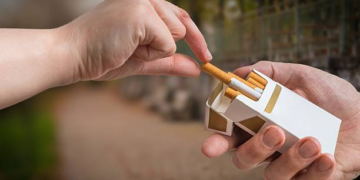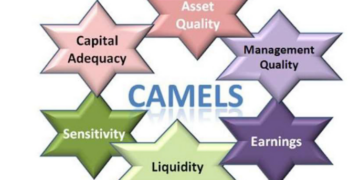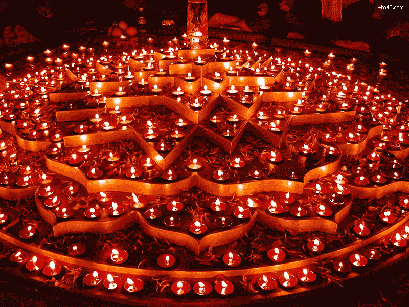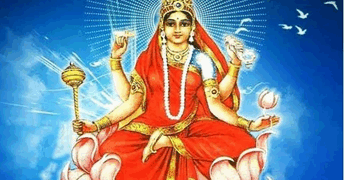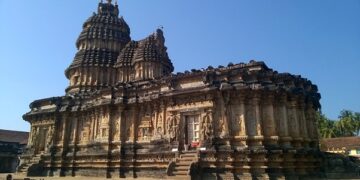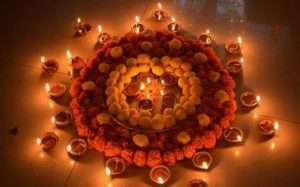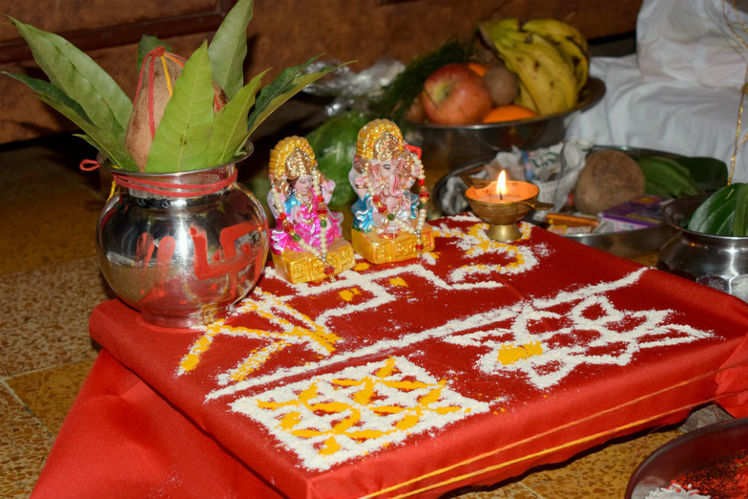Traditionally, Diwali began as an important harvest festival. But, there are different legends pointing to the origin of Diwali. For some, it is the celebration of the marriage of Lakshmi, the goddess of wealth, with Lord Vishnu. While, some believe that it is Goddess Laxmi’s birthday, as Lakshmi is said to have been born on the new-moon day of Kartik; Bengalis celebrate it to worship Kali maa who is considered as the black goddess of strength. On the other hand, few people worship Ganesha—the elephant-headed god who is also symbol of auspiciousness and wisdom on Diwali. Some worship Laxmi, Ganesha and Saraswati – Goddess of wisdom. The Jain community celebrate Diwali to worship Lord Mahavira because he attained the eternal bliss of nirvana. For devotees of Rama, he returned to his Kingdome after his 14-year-long exile and killing the demon-king Ravana. So, worshippers of Lord Rama celebrate joy and happiness. In short, Diwali is a festival of Illuminations for travelling from dark to light.
It’s a five days celebration and each day of Diwali has its own significance.
The first day of Diwali is called Dhan Teras (Dhanvantari Triodasi), and it marks the beginning of the Diwali festivities. On this day, Lord Dhanwantari is believed to have come out of the ocean with Ayurveda, the science of medicine, for the benefit of mankind. A huge amount of buying, specifically gold, silver and precious stones, ornaments, new clothes and utensils is done on this day. In Gujarat, this day is religiously held more important than the actual Deepawali day, people worship Lakshmi, Kuber (the Hindu God of riches) and Ganesha Pooja on this day.
The second day Narak Chaturdashi is celebrated to wash off sins which we create knowingly or unknowingly. On this day, you can say sorry to all those whom you have hurt, and also ask for pardon from the Gods. The most important ritual of the Naraka Chaturdashi is, people wake up early in the morning before sunrise, apply ubtan (made up of sesame oil, herbs, flowers as well as some vital elements) on their body and take holy bath which is called Abhyang Snan. This ritual signifies washing away of sins. In this way one can get relief from all past sins.
The third day of Deepawali, marks the worship of Goddess Laxmi. It is believed that on Laxmi Puja day she is in her most generous mood to fulfil the wishes of her devotees. Amavasya also tells the story of Lord Vishnu who, in his dwarf’s incarnation vanquished the tyrant Bali and banished him to hell. Bali is allowed to return to earth once a year to light millions of lamps and dispel darkness and ignorance while spreading the radiance of love and wisdom.
The fourth day of Diwali is celebrated as Padwa and Govardhan Puja. On this day, Govardhan Pooja is performed. Many thousands of years ago, Lord Krishna saved people from dangerous downpour caused by God Indra. Therefore, people perform Govardhan Pooja. And, Padwa is one of the auspicious days to make beginning of any good work. It is one of the Sade Theen Muhurtha, Three and half days called Sade Teen in Marathi and Muhurat means auspicious time. They are Chaitra Shukla Paksha Padyami (Prathama) – Ugadi / Gud Padwa, Vaisaka Suhkla Paksha Tritiya – Akshaya Tritiya/Akha Teej Aaswayuja (Ashwin) Shukla Paksha Dasami – Vijaya Dasami / Dussera and the Half Muhurat is on this Diwali day Padwa, also called Bali Padyami / Bestu Varsh (Gujarati New Year).
The fifth day of the Diwali is called Bhau Beej, dedicated to brother-sister relation. There is legend that Yamaraja, the Lord of Death, visited His sister – the river Yamuna on this day. He gave Yamuna a boon that whoever visits her on this day shall be liberated from all sins; they will achieve moksha (liberation). From then on, brothers visit their sisters on this day to inquire about their welfare, and many faithful people bathe in the holy waters of the Yamuna River. This day is also known as Bhai Fota among Bengalis, when the sister prays for her brother’s safety, success and well being. This day marks the end of the five days of Diwali celebrations.
Wishing you all A Very Happy Diwali and a Happy New Year!!!






